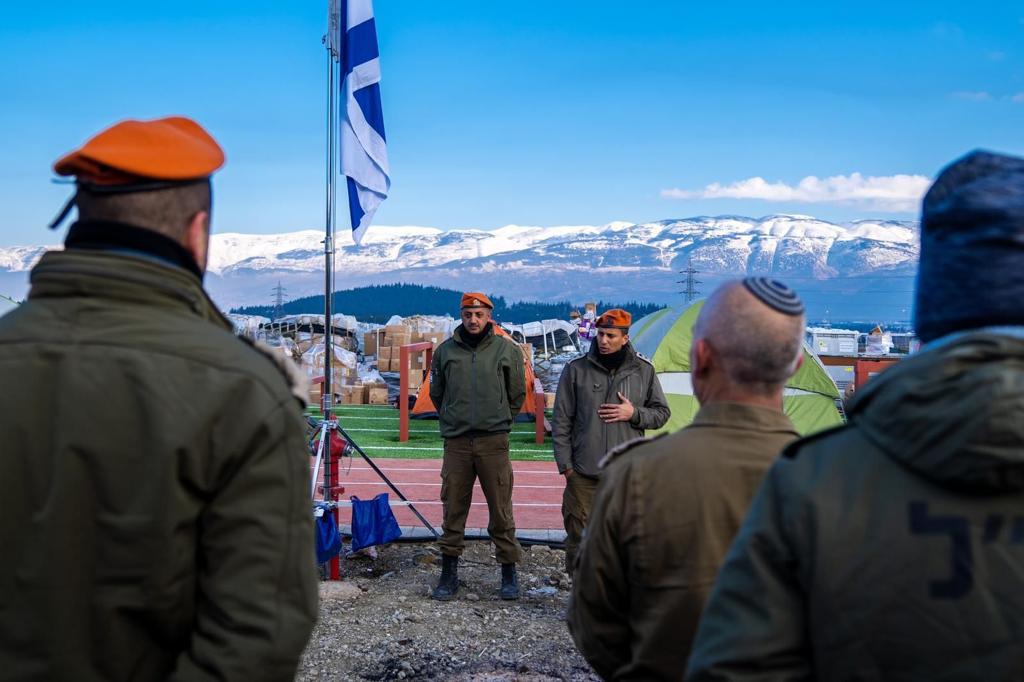The IDF’s Humanitarian Aid Through the Years
The IDF values human life and helps those in need, regardless of their location. No matter the disaster, time and time again these humanitarian missions have been carried out quickly and effectively, saving thousands of lives. Over the years, the IDF sent 31 humanitarian missions around the world.
The IDF values human life and helps those in need, regardless of their location. No matter the disaster, time and time again these humanitarian missions have been carried out quickly and effectively, saving thousands of lives. Over the years, the IDF sent 27 humanitarian missions around the world.
1953: Ionian Islands, Greece
The first humanitarian operation that the IDF carried out was in 1953, when Israel was just five years old. That August, an earthquake hit Greece, taking over 1,000 lives. Israeli Navy ships, which were participating in an exercise in the area, helped the survivors and gave them necessary medical treatment. These sailors paved the way for future IDF humanitarian aid missions.
1975: Cambodia
In 1975, the war between Vietnam and Cambodia created many refugees. An IDF team was sent to the scene, where they stayed for over a month and provided medical care to the displaced persons living in temporary refugee camps on the Cambodian-Thai border.
1985: Mexico City, Mexico
In September 1985, four earthquakes hit Mexico City, the most severe measuring 8.1 on the Richter scale, and took more than 10,000 lives. The IDF sent a delegation of medical and search and rescue teams, consisting of 350 reservists who were called up within three days of the disaster.
![]()

1988: Gyumri, Armenia
On December 6, 1988, an earthquake hit northeastern Armenia and killed nearly 60,000 people. The IDF sent rescue workers and medical supplies to Leninakan (now Gyumri), where 80% of the population was left homeless. The Israeli team was able to rescue 14 people, and worked tirelessly to keep the survivors alive until they were moved to hospitals.
1989: Romania
In the weeks leading up to the Romanian revolution, riots left many Romanians in need. On December 12, 1989, the IDF sent a special aid team of doctors and professional surgeons to Romania to help. Israeli Hercules cargo planes delivered eight tons of medical equipment and food, all of which went towards the effort to aid the Romanian people.
1992: Zagreb, Croatia
On April 18, 1992, during the civil war in Bosnia (now Bosnia and Herzegovina), Israel sent 13 tons of humanitarian aid to Zagreb, in nearby Croatia for those suffering as a result of the war.
1994: Buenos Aires, Argentina
On July 18, 1994, Hezbollah operatives committed a massive terror attack on the Asoción Mutual Israelita Argentina (Argentine Israelite Mutual Association), or AMIA, a Jewish organization, in Buenos Aires, Argentina. It was Argentina’s deadliest bombing, and devastated the Argentine Jewish community, which is one of the biggest in the world. 85 people were killed in the attack, and hundreds more were injured.

![]()
A search and rescue team and other IDF teams were sent to Buenos Aires, where they started working as soon as they landed. The IDF delegation developed a new, extremely efficient, and highly advanced search and rescue mechanism.
1994: Goma, Democratic Republic of the Congo
On July 23, 1994, the IDF sent a team of 270 personnel on a 40-day-long humanitarian aid operation. They brought equipment, food, and clothes for refugees of the Rwandan Civil War. During the operation, IDF personnel set up a field hospital and supplied much-needed medical care.
1998: Nairobi, Kenya
On August 7, 1998, a car bomb exploded near the US embassy in Nairobi, Kenya.
The Prime Minister of Israel deployed an IDF task force of 170 people, including search and rescue teams and medical experts, to the scene. The IDF task force was the first foreign mission to reach the site, and were able to rescue three survivors.

![]()
1999: Macedonia
In 1999, refugees began fleeing to Macedonia as a result of the conflict in Kosovo. On April 6, 1999, the IDF sent an aid delegation of 60 personnel to Macedonia where they built a field hospital with 100 beds. There, Kosovo refugees were able to receive the aid they needed.
1999: İzmit, Turkey
On August 17, 1999, an earthquake, which measured 7.4 on the Richter scale, hit northwestern Turkey. Tens of thousands of buildings collapsed and tens of thousands of people were presumed missing.
The IDF Home Front Command went on a rescue mission to help those in Turkey cope with the aftermath. They rescued 12 survivors, and organized a field hospital where they treated 1,200 wounded people, performed 40 operations, and delivered 15 babies.

1999: Athens, Greece
On September 7, 1999, an earthquake struck Athens. The natural disaster killed 143, injured another 2,000 people, and caused major damage throughout the city and nearby towns.
The IDF sent a delegation to Athens to participate in a search and rescue effort alongside Swiss and French teams. The delegation supplied heavy engineering tools, which enabled the rescue teams to work quickly and efficiently.
2001: Gujarat, India
On January 26, 2001, an earthquake measuring 7.7 Richter scale hit Gujarat, India. The damage killed approximately 20,000 people and injured another 167,000. It also destroyed nearly 400,000 homes, and left 600,000 people homeless.

![]()
An IDF delegation of search and rescue soldiers created a 100-bed field hospital near the disaster site. The delegation treated 1,300 injured, performed 52 surgeries, and delivered 12 babies.

![]()
2004: Taba, Egypt
On October 7, 2004, a truck drove into the lobby of the Taba Hilton and exploded, killing 31 people and wounding 159. Most of the hotel’s structure collapsed after the explosion.
The IDF delegation, which consisted of Medical Corps and search and rescue teams, worked for three straight days at the site, helping as many people as possible.
2004: Colombo, Sri Lanka
On December 26, 2004, Sri Lanka was hit by a major earthquake and a tsunami, which created deadly flooding and destroyed large areas in Southeast Asia.
The IDF deployed a delegation that consisted of three doctors, a representative from the Search and Rescue Company, and a representative of the Ministry of Foreign Affairs. The team was able to quickly provide medical supplies and necessities.
2005: New Orleans, United States of America
After seeing the devastating effects of Hurricane Katrina in New Orleans in August 2005, IDF Chief Medical Officer Brig. Gen. Yeheskel Levy coordinated the transfer of 80 tons of humanitarian aid supplies to the United States of America.
2006: Nairobi, Kenya
On January 24, 2006, a five story building collapsed in Nairobi, Kenya. Israel sent a team of 80 search and rescue personnel to assist with the rescue efforts, under the command of Maj. General Yitzhak Gershon, Chief of the Home Front Command.

![]()
2010: Port-au-Prince, Haiti
On January 12, 2010, a major earthquake hit Haiti and the Dominican Republic. Tens of thousands of people were killed and hundreds of thousands were displaced.

![]()
The IDF delegation, which was sent to Port-au-Prince, Haiti, saved many people from the ruins and set up field hospitals. There, Israeli medical personnel treated more than 1,110 patients, completed 319 successful surgeries, and delivered 16 babies, including three caesarian sections.

![]()
2010: Bogotá, Colombia
After heavy rains hit Colombia in December 2010, widespread flooding affected two million people. Nearly 3,860 square miles of farmland were underwater, and hundreds of people died in the resulting flooding and landslides.

![]()
The IDF and Israel’s Ministry of Defense sent a humanitarian aid delegation with approximately 50 tons of equipment, to Colombia, including 20 tons of food, 5,000 medical kits, 2,000 blankets, 1,000 ponchos, 1,000 mattresses, and 100 tents. In addition to the supplies, Israel provided medical care to the victims.
2011: Minamisanriku, Japan
In March 2011, a powerful earthquake off the northeastern coast of Japan’s main island caused major on-land damage and a series of tsunami waves that devastated Japan’s coast.

![]()
The IDF Home Front Command and Medical Corps aid delegation was deployed to Minamisanriku. The delegation opened an advanced medical clinic with pediatrics, surgical, maternity, gynecological, and otolaryngology wards, an optometry department, a laboratory, a pharmacy and an intensive care unit. During their humanitarian mission, the IDF Medical Corps physicians treated 220 patients.

![]()
2011: Erciş, Turkey
On October 23, 2011, a severe earthquake struck Turkey. More than 570 people were killed and thousands of structures were destroyed.
The IDF focused on treating those who were rescued or evacuated in temporary buildings that were used as rehabilitation centers and field hospitals.
![]()
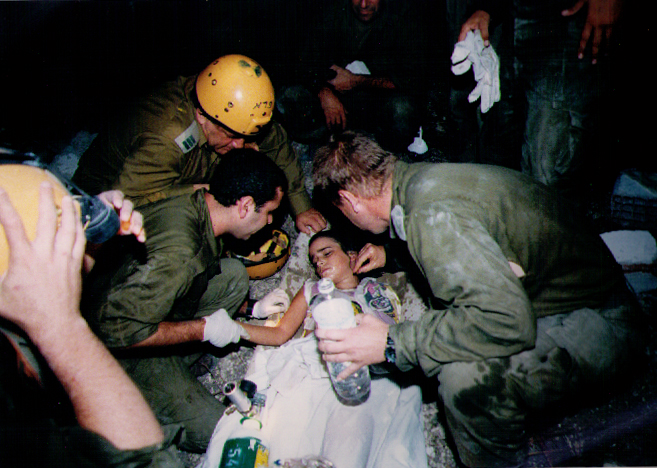
2012: Burgas, Bulgaria
In July 2012, Hezbollah bombed a bus carrying 42 Israelis on its way from the airport in Burgas, Bulgaria to local hotels. The terrorist attack killed the Bulgarian bus driver, as well as five Israelis, and injured 32 others.
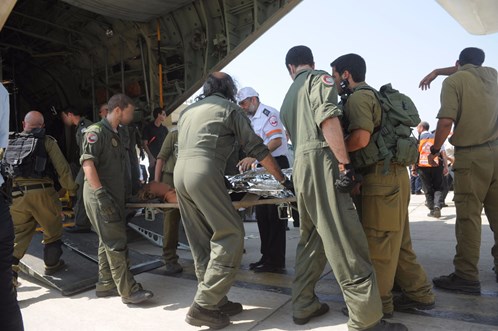

The Home Front Command, the Israeli Air Force, and the Medical Corps dispatched an aircraft carrying a medical team to Bulgaria following the terrorist attack. The team provided medical care and helped the injured Israelis return home.
2012: Accra, Ghana
In November 2012, a large department store collapsed in Accra, Ghana. An IDF Home Front Command delegation arrived in Accra to help with the relief effort. The delegation included a team of experts and equipment specifically designed to rescue people trapped under ruins. In all, they rescued 78 people from the debris.
2013: Tacloban City, Philippines
On November 8, 2013, Typhoon Haiyan struck the Philippines. The storm affected approximately 7 million people. More than 660,000 people were forced to evacuate their homes, and about 320,000 were sheltered in evacuation centers.
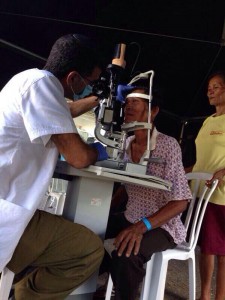

A 148-member delegation of Israeli soldiers and officers went to the Philippines in order to provide search, rescue, and medical services in typhoon-struck Bogo City. They quickly established an advanced, multi-department field hospital, equipped with approximately 100 tons of humanitarian and medical supplies from Israel.
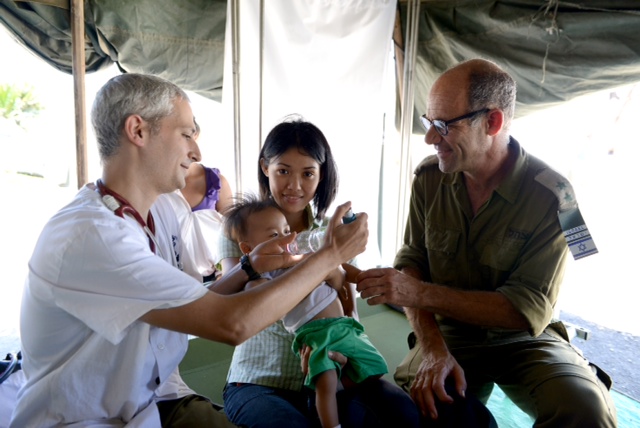

2015: Kathmandu, Nepal
On April 25, 2015, a massive earthquake struck Nepal, killing more than 2,000 and injuring more than 4,700 people. A 260-member IDF delegation was deployed to Kathmandu, Nepal where they provided search and rescue and medical services.
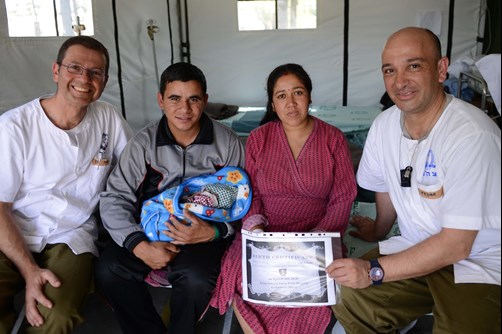

The delegation established a state-of-the-art, multi-department field hospital where they treated 1,600 patients, delivered eight babies, and performed 85 surgeries. In addition to medical treatment, the IDF supplied 95 tons of humanitarian aid equipment to the Nepali people.
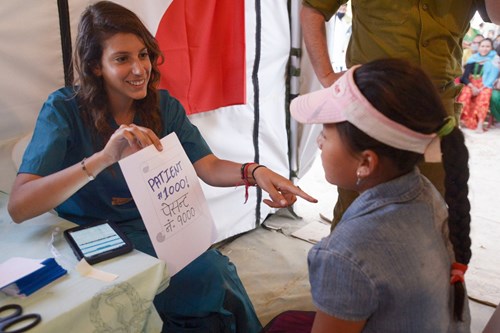

2016-2018: Syrian Border, Golan Heights
One night, a wounded Syrian man came to the border seeking medical attention. Little did he, or the soldiers who helped him, know, that this would spark a large-scale humanitarian operation - Operation Good Neighbor.
Through this operation, the IDF provided Syrians in need with medical care, infrastructure, and civilian aid. Over 4,000 people, including 1,409 children, were treated in Israeli hospitals and field hospitals. In one such field hospital, Mazor Ladach, 6,763 people were treated.
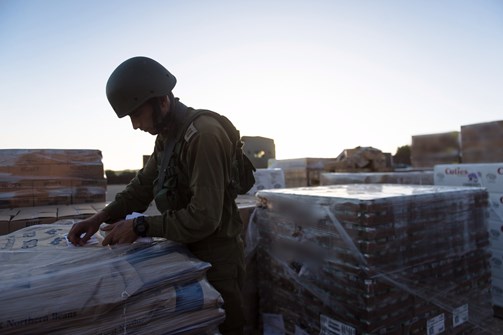

Since its inception, the IDF provided Syrians in need with 22 generators, 40 vehicles, 281,798 gallons of fuel, 646 temporary housing units, 1,741.79 tons of food, 48,933 boxes of baby formula, 8,173 packages of diapers, 350 tons of clothing, and 14,000 hygienic products. Furthermore, the IDF supplied 2,124 containers of medicine and 25,726 boxes of medical supplies, which helped the 685 Syrian children who received medical care.
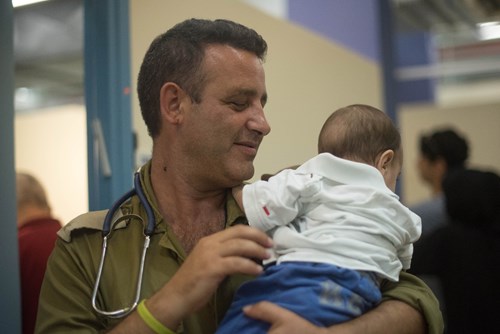

2017: Mexico City, Mexico
On September 20th, 2017, an IDF delegation of approximately 70 men and women departed for Mexico to aid in the earthquake relief efforts. Of those 70 soldiers, 25 are engineers, who helped evaluate the damage and provided assessments and assistance in the disaster zone. The timing of the mission was remarkable, in that the soldiers departed on the first night of Rosh Hashanah, the Jewish new year, which is one of the holiest days of the year for Jews.
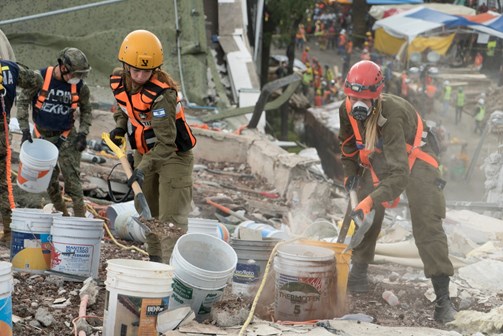
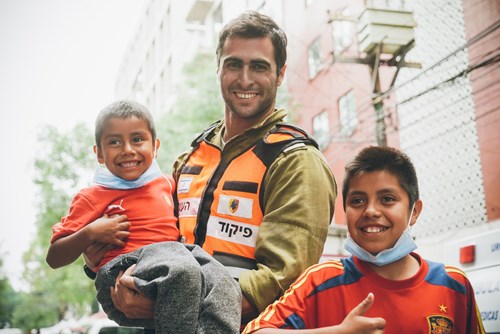

2018: Golan Heights
On July 22, 2018, the IDF carried out a special and extensive humanitarian aid operation in the 210th Division to rescue the members of the White Helmets humanitarian organization and their families. While in Syria, these humanitarian workers’ lives were threatened. IDF troops rescued them from the warzone and safely escorted them to a neighboring country.
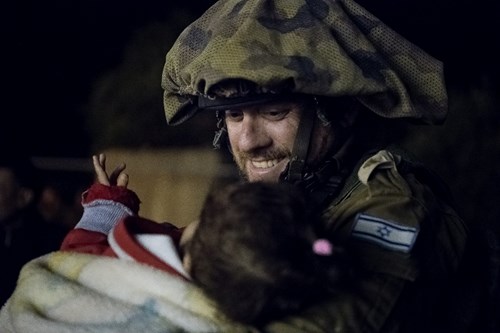
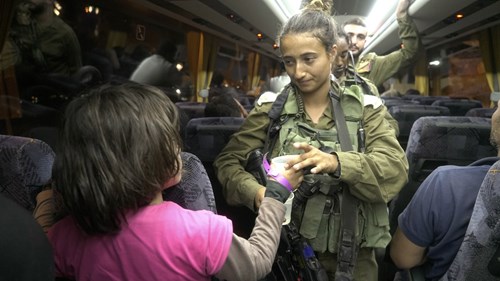
2019: Brumadinho, Brazil
On January 26, 2019, the Brumadinho dam in Brazil collapsed, leaving hundreds missing. The IDF, in close coordination with the Brazilian Government, sent a search and rescue delegation with special teams to assist in the rescue effort. IDF search and rescue teams undertook extensive efforts to assist, using equipment such as advanced cellular location, naval sonar, and drones.
2019: Albania
After a deadly earthquake struck Albania in November 2019, an IDF aid delegation was dispatched to aid in earthquake relief efforts. Over the course of ten days, IDF troops conducted a series of operations, primarily focusing on evaluating and repairing structural damage on vital buildings, such as hospitals, schools, and apartments. These efforts enabled approximately 1,600 Albanian families to return to their homes, as well as the reopening of many vital institutions.
Honduras: 2020
In December 2020, Honuras was struck by two hurricanes. The Home Front Command (HFC) and the Ministry of Foreign Affairs aid delegation hassisted cities in Honduras together with senior officials from Honduras. The aid delegation examined disaster areas and its activities that are concentrated in the cities which suffered the most damage.

2021 : Equatorial, Guinea
On Sunday, March 7, 2021, a series of major blasts in the Nkoa Ntoma camp, devastated buildings at the military compound and houses in surrounding districts. The IDF sent an humanitarian aid delegation. During the delegation’s seven days of operation, medical forces worked in the three hospitals in the city and operated mobile clinics for villages on the outskirts, providing medical assistance to 725 patients, and performing 92 life saving surgeries and medical procedures. At the same time, the rescue and training forces surveyed dangerous structures.

Surfside, Miami: 2021
On June 24, 2021, a 40-year-old building in the city of Surfside, Miami collapsed in the middle of the night. Due to the collapse of the building, ninety-eight people were killed. Members of the “Helping Hand” delegation of the IDF and the Ministry of Foreign Affairs assisted in the search and rescue efforts for missing persons at the site of the collapsed building in SurfSide, Miami.

Türkiye: 2023
On Monday, February 6, 2023 at 4:17 am, Türkiye was hit with a 7.8 magnitude earthquake, resulting in 33,000 casualties. The IDF responded by deploying the “Olive Branches'' Humanitarian Aid Delegation to Türkiye. The mission was led by the IDF Home Front Command in order to assist in the earthquake-stricken area of the country.
Upon the team’s arrival, the delegation immediately began assisting by establishing a field hospital. The medical staff, which consisted of over 140 doctors and nurses, provided medical assistance to individuals rescued from the sites hit by the earthquakes. By the end of their mission, they provided medical treatmemt to 470 patients. 19 individuals were extracted by the search and rescue teams after being trapped under the rubble, two of them being a 2-year-old baby and a 65-year-old man.
